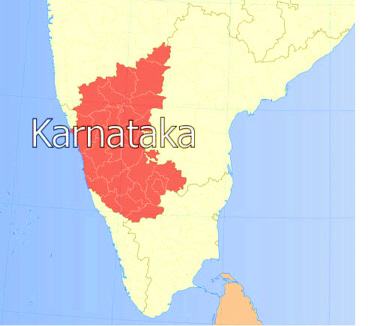
(Bildquelle: PlaneMad/Wikipedia. -- CC-by-sa)

(Bildquelle: PlaneMad/Wikipedia. -- CC-by-sa)
Zitierweise / cite as:
Hodson, Thomas: An elementary grammar of the Kannada, or Canarese language. -- 5. Adjectives (§§ 62 - 68). -- Fassung vom 2011-08-23. -- URL: http://www.payer.de/hodson/hodson05.htm
First published as: Hodson, Thomas: An elementary grammar of the Kannada, or Canarese language ; in which every word used in the examples is translated, and the pronunciation is given in English characters. -- 2. ed. -- Bangalore : Wesleyan Mission Press, 1864. -- 128 p. ; 23 cm.
First time published here: 2011-08-23
Revisions:
©opyright: Public domain
This text is part of the section Sanskrit und Indien of Tüpfli's Global Village Library
If you don't get the diacritics displayed, install a Unicode font like Tahoma.
62. Adjectives (§ 202.) generally precede the nouns to which they belong. Thus,
63. ಮರಿ mari, a young animal, is affixed to express the young of quadrupeds, fishes and insects; &c., as,
ಗುಂನೆ guṃne, young is also affixed; as,
64. ಕರು karu, a calf, is added to denote the young of cows and buffaloes only; as,
65. Relative Participles are used, before nouns, like adjectives, and in them the Relative Pronouns who and which are implied. Thus
66. There are not many Adjectives in the Canarese language; the defect is supplied by affixing to Nouns the irregular participles ಆದ āda1, and ಉಳ್ಳ uḷḷa1. ಅಂಥ aṃtha, such, is frequently added to these participles, as in the following examples:
1 ಆದ āda, who or which became, or has become, is the past relative participle of the verb ಆಗು āgu, to be, become, &c. -- ಉಳ್ಳ uḷḷa, who or which is, or possesses, is the past relative participle of the defective verb ಉಂಟು uṃṭu, there is. (§ 119 and 127.)
67. There is nothing in Canarese corresponding with the English er and est, more and most, by which adjectives can be compared. Comparisons are generally made by ಇಂತ iṃta, added to the dative case. The word ಇಂತ iṃta, signifies than; as,
68. Comparisons may be expressed by the dative and locative cases without the addition of ಇಂತ iṃta. Thus,